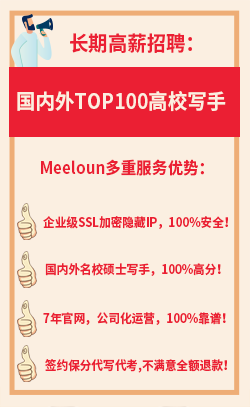会计学Essay代写范文:会计职业道德
发表时间:2015-09-18 13:08:36 作者:zhouzhengmao 阅读:117次

说到会计专业,这里告诉大家一个常识:很多同学都觉得会计都是跟经济行业打交道,从事的工作也都是经济相关,那么就认为会计是经济学专业!答案是否定的!会计专业不属于经济学类,而是属于工商管理类,毕业后是拿管理学学士,而不是经济学学士。大家一定要搞清楚哦,不要出国留学毕业后发现辛辛苦苦留学好几年怎么拿的是管理学学位证书。
职业道德是指在人们的职业生活中遵循的基本道德。即一般社会道德在职业生活中的具体体现,它是专业胜任能力和职业责任结合专业的学科,属于自我调节的范围,在专业生活的某些方面通过公约、法规等来调节。作为最古老的职业之一,会计已经发展了自己的伦理,会计伦理。会计职业道德是会计人员职业道德适用于他们的职业和日常生活中,它汇集会计人员的职业特点,成为会计职业和和经济关系的坐标。
下面为大家整理了一篇财务管理Essay代写范文,结合相关阅读材料探讨会计职业道德的相关理论以及讨论会计伦理在现代经济社会中的作用与体现。
Introduction 简介
Professional ethics refers to the basic moral to be followed in people’s professional life. Namely, the general social morality embodied in professional life. The term of professional ethics is the combination of professional morality, professional discipline, professional competence and professional responsibility (Valentine, Fleischman& Bateman, 2015). It belongs to the scope of self-regulation, which regulates on some aspects of professional life through conventions, codes and so on. Professional ethics is both the conduct guidelines of participator and expects of the public, and moral norms and responsibility of participator to the public. As one of the most ancient professions, accountancy has developed its own ethics, Accounting ethics. Accounting ethics is the professional ethics applies to accountants during their professional and daily life, which highlights the professional features of accountants, coordinates the professional and economic relationship in accountants’ professional and daily life (BADEN, 2014). It is the general public morality embodied in accounting work, guidance, which restricts participator’s behavior, adjusts social norms and social relationships between the accountants and society and the relationship between accountants and various interest groups. It runs throughout all areas of accounting work and reflects the integration of social development and personal characteristic development. It also relies on interpersonal relationship adjustment that if it is reasonable, or consistent with the morality requirements and rightfully expects of the society. It transfers the outside, meaning the society, requirements and expects to a internal non-mandatory specification to accountants (Martinov-Bennie&Mladenovic, 2015). Therefore, accounting profession should be practical, intellectual and have regard for the public. In serving the public, it is imperative that professions have and demonstrate a systematic and elite knowledge. it is consistent with the accounting ethics. It will give a brief introduction of accounting ethics and the importance of accounting ethics in the aftermath of the global financial crisis, since interest in the role of accountancy profession in supporting public value remains high.
Accounting ethics and public value 会计伦理与公共价值
From a historical point of view, accounting is individual behavior of economic agents from gradually developed into a universal social behavior. In this process, along with the development and maturation of the accounting techniques and methods, casting a constraint travel accounting staff code of conduct, including profit or non-profit organization glimpse covet, independent registered accountants and accounting professional ethics. Accounting professional ethics is not static; the second is an evolving process. With the development of market-oriented economy and technology to accelerate economic interests more orientation affects every member of society. At the same time, accounting only can be further deficit station and derivatives. Accounting methods and means have undergone profound changes (Kidwell, Braun& Swanson, 2013). As ideological categories, modern accounting profession first formation and development often go through three stages. Firstly, the responsibilities and obligations of the accounting profession as the core, focusing on the individual's social 'prevention' theory of desire 'bondage' Disciplining stage. Secondly, the accounting profession conscience as the core accounting functions into a first inner sense of self-accounting staff and first Code of Conduct. Thirdly, occupation conscience commander career goals in integration, professional ethics and self-regulation height heteronomy unified external value-oriented accounting professional first target of the code, to strengthen the accounting profession first Education, primary accounting personnel can enhance accounting professional accomplishment, is to form good habits and improve accounting profession first accounting profession, and effectively ensure other accounting Specification smooth implementation of an important condition (Apostolou, Dull & Schleifer, 2013).
The functionalities of accounting ethics are majorly in three aspects as following.
Firstly, it is the guidance function. In social and economic life, the accounting professional ethics can guide the direction of accounting practices accounting officer, showing the accounting professional ethics guidance function. Accounting Professional Ethics to guide the public and voluntary choice of accounting personnel in favor of the elimination of all contradictions, adjust the relationship between the accounting ethical behavior, to avoid conflict between the expansion of mutual, to ease the conflict and resolution have been produced to improve the field of accounting wife between individuals and units, the relationship between people and between individuals and the State, to promote harmonization of accounting personnel, quality and quantity, and timely completion of accounting. Meanwhile, the accounting professional ethics professional ethics performance by public opinion and accounting personnel, scientific influence and guide the direction of accounting (Chunhui & Nan, 2012). Secondly, it is the evaluation function. So that people on the basis of accounting ethics accounting ethics standards in the form of public opinion and personal mental activities, accounting and other professional conduct of accountants were good and bad reviews, marked appraise attitude. Ratings accounting professional ethics allow accountants to develop a strong work ethic responsibility for the proper accounting practices have to meet the moral behavior of improper accounting critique moral facilitate the adjustment of professional conduct of accountants, improve accounting professional style. Thirdly, it is the enlightenment function. Accounting professional ethics by causing public opinion, the formation of accounting morality, and establish a profound impact on the accounting profession moral example and other means, educate people, especially the accounting staff accounting ethics and accounting ethical behavior, culture and moral habits and exercise accounting morality, prompting Accounting Sublimation of Personality and raise moral standards of society (Wong-On-Wing & Lui,2013). Education functions of accounting professional ethics on the one hand to guide accountants perform accounting professional ethics principles and accounting professional ethics, on the other hand by the accounting staff to comply with the accounting professional ethics and social morality directly and indirectly in a variety of social activities, promote social ethics level continues to increase.
One has the appropriate business knowledge, but cannot do the accounting officer responsible for the work; the participator is difficult to accomplish the tasks of. Therefore, the accounting officer should be equipped with the appropriate skills. Firstly, as a corporate accountant, their main task is to take place on the economic issues of the enterprise for accounting, so the ability to use accounting knowledge to solve real-world problems, is an accountant for each basic requirement. Secondly, the accounting officer should have good emotional intelligence, good interpersonal skills, especially accounting officer, and even more so (Mei-Lung, Chen & Chenoweth, 2013). Only in this way, it helps to carry out proper and reasonable accounting method of accounting personnel.
Accounting ethics in the aftermath of global financial crisis全球金融危机后的会计伦理
There are three major issues in the aftermath of global financial crisis. Firstly, it is the lack of authenticity of accounting information. Post-crisis era, in the process of enterprise development, more and more attention authenticity of accounting information, accounting information has become the main basis for decision-making of investors and managers, accounting information lack authenticity, the system can not fully reflect the economic activity in the development process. The lack of authenticity of accounting information has become a major problem facing the development of enterprises, and gradually accelerate the speed of development, so that the accounting staff lack professional and moral qualities, the process of carrying out accounting activities, the work ethic is the basic principle to be followed accounting personnel, but also social Moral Construction of key components. Secondly, the accounting staff of professional ethics is missing. Since the accounting staff of the special nature of their own, face the temptation of economic interests, so that the accounting officer was forced to compromise, so that the accounting staff in violation of national laws and regulations, ethics serious deficiencies (Loeb, 2015). During operation, the part of the accounting staff to make itself more economic benefits, using its own functions, use of corporate public funds, a relatively low professional quality of some of the staff cannot meet the needs of the development of the knowledge economy era. Thirdly, legal awareness, supervision and management mechanism is not perfect. In the process of enterprise development, most accountants do not focus on accounting related laws and regulations, are not familiar with and understand the basic content of the accounting professional ethics that often occur ideology of individualism and consumerism, although China has issued a corresponding accounting law Regulations, however, in the actual work, the intensity of the implementation is weak. In the process of building accounting regulations, supervision and management mechanism is not perfect; the internal audit department exists only in form, not the effective functioning of the supervision and management.
There are five major measures to help to strengthen accounting ethics as following. Firstly, it is to pay attention to the legal system, improve law enforcement efforts (Persellin, Shaub, & Wilkins, 2014). Post-crisis era, as a serious lack of legal construction, therefore, enterprises in the development process, we should pay attention to the legal system. Enterprises in order to better in the fierce competition in the market to survive and develop, we must take the law as the basis, by way of legitimate business, and improve the competitiveness of their own development. Secondly, it is to establish and improve the moral evaluation mechanisms. Accounting professional ethics evaluation mechanism means: enterprises to establish a special evaluation mechanism, the main contents of evaluation is the moral quality of the staff, system construction is its powerful guarantee, based on information resources, through scientific and rational evaluation methods to ensure that the basic content of the evaluation, using a series of acts reflect the accounting staff of professional ethics in general. Scientific, rational ethics evaluation system, to accelerate the construction process of accounting credit system, moral evaluation system includes many aspects, such as setting organization, indicators and methods of evaluation and the evaluation of the system and so on (Tweedie, et al, 2013). Thirdly, it is the introduction of advanced management concepts of Western countries. In the process of enterprise development in the United States, accounting information disclosure system has been recognized by various countries, however, in the process of enterprise development, still there are many problems, therefore, the relevant administrative departments of enterprises should gradually adapt and accept the American Accounting Information Management philosophy, based on the actual development of the market continues to expand in other markets, and thus rising accountancy professional ethics. Fourthly, it is to strengthen accounting practitioners vocational skills and professionalism. Accounting practitioners vocational skills and professionalism directly affect the quality of accounting information, so business-related managers should be fully aware of the importance of professionalism in accounting practitioners, practitioners regularly accounting professional ethics education and training, in order to make accountancy practitioners personnel able to bind their own behavior, and thus accelerate the pace of construction of accounting professional ethics. Fifthly, it is to establish rational incentives (Bolt-Lee& Moody, 2010). In the process of enterprise development, and professional quality of accounting personnel play an important role, therefore, enterprises should establish a scientific and reasonable incentive mechanism, in the course of its daily work, for the professional ethics of accountants, managers should establish the relevant assessment, evaluation and incentive mechanism, strictly implement voucher appointment system, and to give employees a certain material and spiritual rewards, and then continue to improve the quality and efficiency of the accounting staff, accelerating the process of accounting personnel morality.
Conclusion结论
In conclusion, accounting profession should be practical, intellectual and have regard for the public. In serving the public, it is imperative that professions have and demonstrate a systematic and elite knowledge.it is consistent with the accounting ethics. It will give a brief introduction of accounting ethics and the importance of accounting ethics in the aftermath of the global financial crisis, since interest in the role of accountancy profession in supporting public value remains high.
References 参考文献
1. Valentine, S, Fleischman, G, & Bateman, C 2015, 'AN EXPLORATORY STUDY OF PROFESSIONAL ETHICAL STANDARDS, POSITIVE BUDGETING ORIENTATION, AND THE MEDIATING ROLE OF CORPORATE ETHICAL VALUES', Accounting & Taxation, 7, 1, pp. 1-20.
2. BADEN, D 2014, 'Look on the Bright Side: A Comparison of Positive and Negative Role Models in Business Ethics Education',Academy Of Management Learning & Education, 13, 2, pp. 154-170
3. Martinov-Bennie, N, & Mladenovic, R 2015, 'Investigation of the Impact of an Ethical Framework and an Integrated Ethics Education on Accounting Students' Ethical Sensitivity and Judgment', Journal Of Business Ethics, 127, 1, pp. 189-203
4. Kidwell, L, Fisher, D, Braun, R, & Swanson, D 2013, 'Developing Learning Objectives for Accounting Ethics Using Bloom's Taxonomy', Accounting Education, 22, 1, pp. 44-65
5. Apostolou, B, Dull, R, & Schleifer, L 2013, 'A Framework for the Pedagogy of Accounting Ethics', Accounting Education, 22, 1, pp. 1-17
6. Chunhui, L, Lee J., Y, & Nan, H 2012, 'Improving Ethics Education in Accounting: Lessons from Medicine and Law', Issues In Accounting Education, 27, 3, pp. 671-690
7. Wong-On-Wing, B, & Lui, G 2013, 'Beyond Cultural Values: An Implicit Theory Approach to Cross-Cultural Research in Accounting Ethics', Behavioral Research In Accounting, 25, 1, pp. 15-36
8. Mei-Lung, C, Chen, R, & Chenoweth, T 2013, 'STAND-ALONE COLLEGE ACCOUNTING ETHICS COURSE AND INSIGHT FOR ACCOUNTING ETHICS MODULES', International Journal Of Education Research, 8, 1, pp. 1-16
9. Loeb, Ss 2015, 'Active Learning: An Advantageous Yet Challenging Approach to Accounting Ethics Instruction', Journal Of Business Ethics, 127, 1, pp. 221-230
10. Persellin, J, Shaub, M, & Wilkins, M 2014, 'Arachnophobia: A Case on Impairment and Accounting Ethics', Issues In Accounting Education, 29, 4, pp. 577-586
11. Tweedie, D, Dyball, M, Hazelton, J, & Wright, S 2013, 'Teaching Global Ethical Standards: A Case and Strategy for Broadening the Accounting Ethics Curriculum', Journal Of Business Ethics, 115, 1, pp. 1-15
12. Bolt-Lee, C, & Moody, J 2010, 'Highlights of Finance and Accounting Ethics Research', Journal Of Accountancy, 210, 4, pp. 38-41



